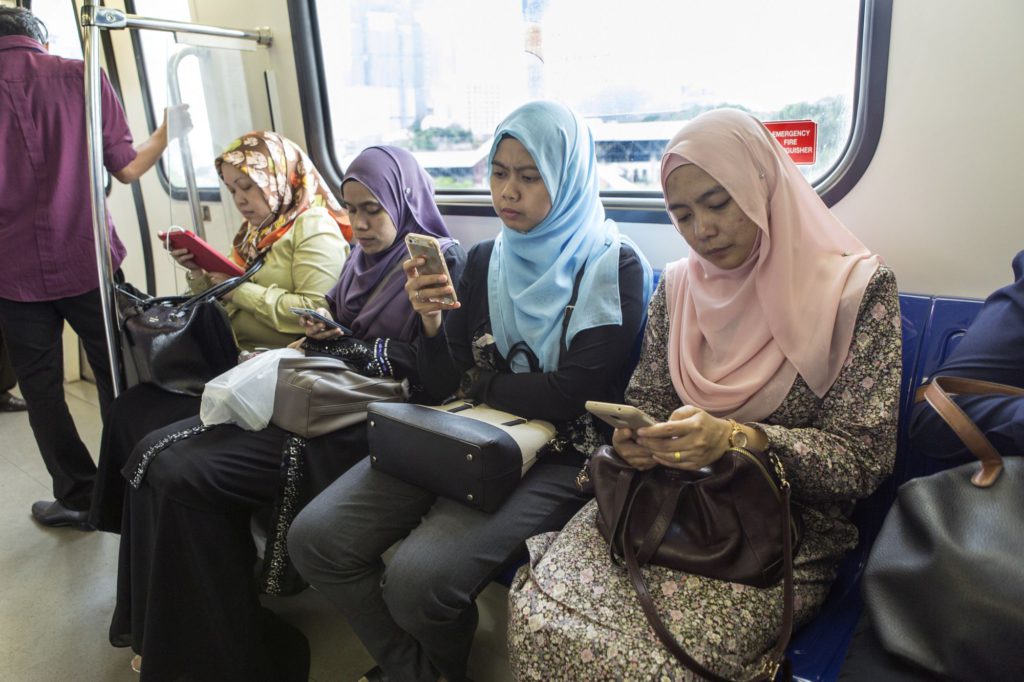(Bloomberg) — Trailing regional rivals in the race to offer 5G mobile services, Malaysia is finally pressing ahead with a plan to roll out the high-speed network across the country even as local carriers wrangle over equity participation in the project.
State-owned Digital Nasional Bhd., which is building the infrastructure at a cost of 16 billion ringgit ($3.7 billion) spread over 10 years, has offered all nine telecommunication companies in the Southeast Asian country equal stakes totaling as much as 70% by June 30. But the top four carriers have been pushing for a combined 51% majority stake to themselves instead.
The government intends to deploy the network regardless of the operators’ decision, Digital Nasional’s Chief Executive Officer Ralph Marshall said in an interview. If the carriers don’t reach an agreement, the government will look at other options for equity financing, he said.
“Basically if you don’t come in, we just have to open up the market,” Marshall said last week at his office in Kuala Lumpur. “The principle is accelerating the deployment and adoption of 5G in the national interest.”
Malaysia has been one of the 5G laggards in Southeast Asia. In terms of average mobile download speeds, it trails Singapore, Vietnam, Thailand, the Philippines and Indonesia, which have rapidly rolled out the network, according to a report by Opensignal. 5G coverage in Malaysia is still spotty with limited access in Kuala Lumpur, Cyberjaya and Putrajaya.
Digital Nasional aims to have a 5G network with 40% reach in densely populated areas by the end of this year, compared to about 15% as of March, according to Marshall. It targets to extend it nationwide to 80% in populated areas by 2024, he added.
Cheaper Than 4G
At the same time, the infrastructure provider is also seeking to keep tariffs affordable. It is charging carriers less than 20 sen per gigabyte for 5G service, Finance Minister Zafrul Abdul Aziz said in Parliament in November. That compares to a rate of between 45 and 55 sen per gigabyte for 4G services, he added.
But the debate on the network has mostly centered around the purchase of equity in Digital Nasional by the nation’s carriers. Celcom Axiata Bhd., DiGi.com Bhd. Maxis Bhd. and U Mobile Sdn., want a 51% majority stake, Communications Minister Annuar Musa said, according to a Bernama report on May 26. Celcom is trying its best to meet the deadline process, Axiata Group CEO Izzadin Idris said May 26. Izzadin stepped down on May 31.
“DiGi continues discussions with the government, MCMC and DNB with regards to various aspects of 5G, and according to processes in place. We will comment on vital milestones as they occur,” DiGi spokesperson said by email on Tuesday.
Celcom, Maxis and U Mobile didn’t immediately respond to requests for comment.
YTL Communications Sdn., a unit of YTL Power International Bhd. controlled by tycoon Francis Yeoh, is one of two telecommunication firms that have signed up to use Digital Nasional’s 5G infrastructure so far, a May 1 Bernama report cited Musa as saying. The other one is fixed-line operator Telekom Malaysia Bhd.
Last week, YTL launched a 5G-ready mobile network plan, which offers average data charges of 30 sen per gigabyte, according to a statement.
Digital Nasional needs as much as 6 billion ringgit in terms of working capital facilities to roll out the planned 5G network, Marshall said. The company has secured 500 million ringgit in short-term financing from Deutsche Bank AG and 800 million ringgit from United Overseas Bank Ltd., according to him.
Digital Nasional is also planning a 5 billion ringgit sukuk or Islamic bond to take over these short-term financing, Marshall added.
The 16 billion-ringgit cost, outlined by Marshall, covers mainly 5G network equipment and infrastructure, of which Ericsson is a provider, according to Digital Nasional’s official website.
More stories like this are available on bloomberg.com
©2022 Bloomberg L.P.











